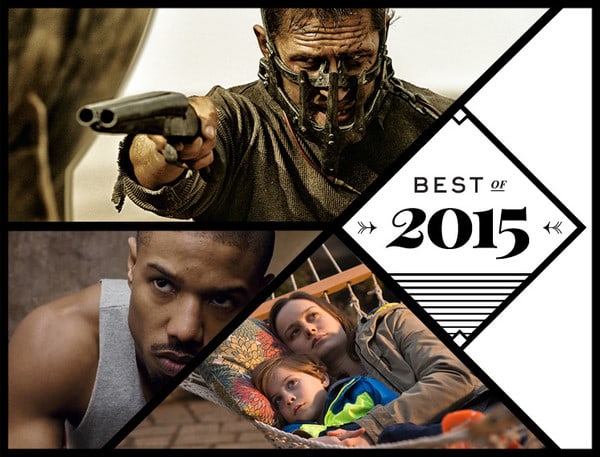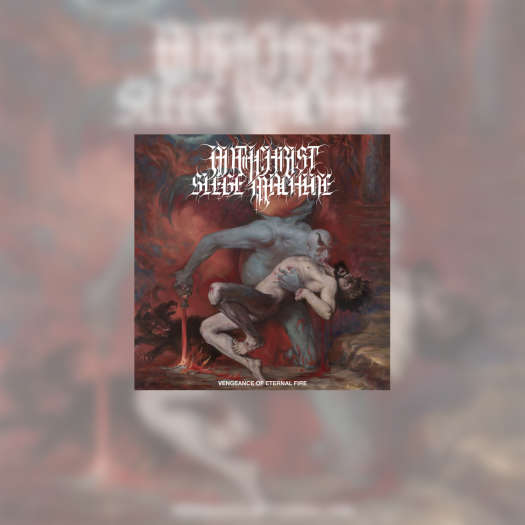It was an interesting year at the movies, that's for sure. The middle class of movies slowly faded away as indie flicks went straight to on-demand and giant juggernauts commanded huge box office numbers. Along with the disappointments and the ones that didn't get enough love, there were also plenty of great cinematic moments in 2015. From iPods to pedophile priests to animated emotions to desert-set road battles, it's one hell of a diverse list. Here are Exclaim!'s 10 best movies of 2015.
10. Creed
(Directed by Ryan Coogler)
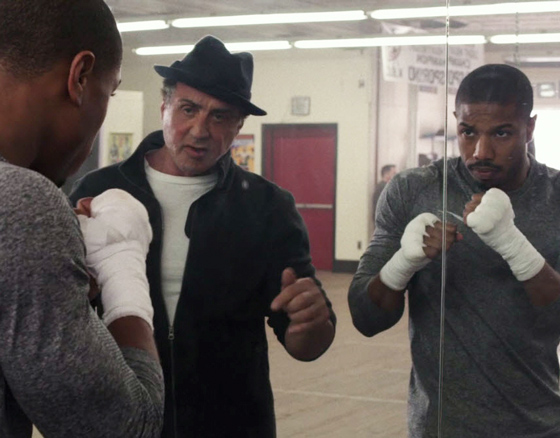
When a spin-off of the Rocky franchise focusing on the son of Apollo Creed was initially announced, the decision elicited far more eye rolls than cheers. After all, it had been nearly 40 years since Sylvester Stallone first introduced his underdog boxer to moviegoers and, after five sequels, nearly everyone believed both Rocky and the series were ready to be finally put out to pasture. Yet another return to the ring after what certainly seemed like his final swan song in 2006 with Rocky Balboa would only be viewed as a desperate cash grab that risked further tarnishing the legacy of an iconic character.
That's probably the biggest reason Ryan Coogler's Creed ultimately emerged as such an unlikely revelation, seamlessly passing the baton from one generation's fighter to another in a way that felt both familiar and fresh. From Michael B. Jordan filling out the title role with raw charisma, Stallone delivering his best performance in easily a decade or two and Tessa Thompson capably stepping in as the new Adrian for the younger Creed, Coogler succeeded by returning the franchise back to its gritty roots in the streets of Philadelphia and offering exhilarating fight sequences alongside genuine emotion. (Warner Bros.)
Kevin Scott
9. Spotlight
(Directed by Thomas McCarthy)
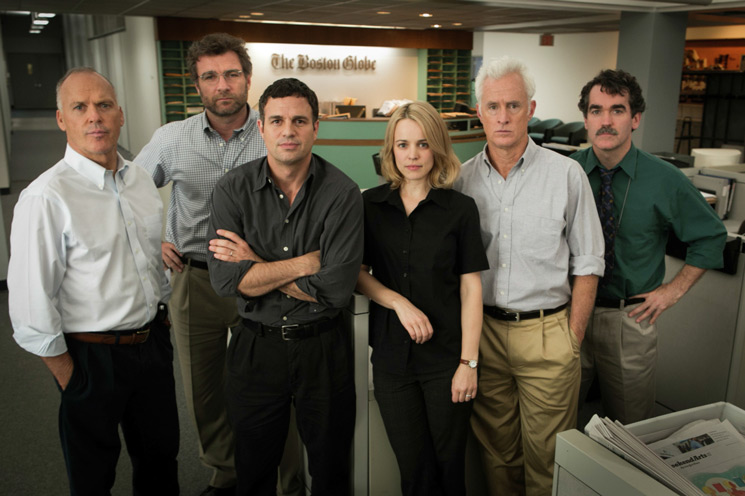
Just as the investigative reporters at the Boston Globe used their different sets of skills to bring to light a large group of priests engaged in pedophilia inside the Catholic Church, the brilliant ensemble cast in Tom McCarthy's Spotlight employs their individual talents to bring the story to life.
Mark Ruffalo gets most of the showier moments as the tireless Mike Rezendes, who learns just how difficult it can be to cut through all the red tape surrounding the case. But Michael Keaton's Robby Robinson gives the actor plenty of personal reservations to play, Rachel McAdams' plucky Sacha Pfeiffer struggles to reconcile the magnitude of their discovery with her regular visits to church with her grandmother and Liev Schreiber's editor Marty Baron calmly keeps the pressure on them.
It's immensely absorbing to watch the team doggedly pursue the facts while steeling themselves against the horrors they'll inevitably uncover, using every resource at their disposal to prove just how rampant the sexual abuse truly was. It's a chilling reminder that the most important stories can often leave you the most personally conflicted. (eOne)
Kevin Scott
8. Carol
(Directed by Todd Haynes)
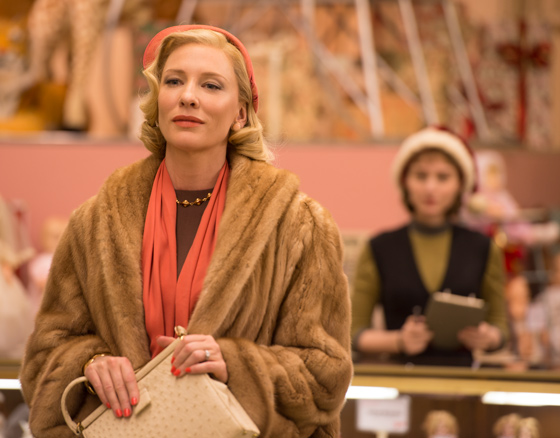
Todd Haynes, master of stylized melodrama and exquisitely rendered melancholy (Far From Heaven, Mildred Pierce) has outdone himself with this wrenching, forbidden love story set in mid-century Manhattan. Based on Patricia Highsmith's cult-classic novel chronicling the irrepressible love affair between the titular polished suburban housewife (Cate Blanchett) and Therese (Rooney Mara), a younger, sprightlier department store clerk, Carol is an Edward Hopper painting come alive, with the scrupulously angular design of its cityscapes and all the shots of women longingly gazing out of windows.
Besides for Carter Burwell's evocative score, Ed Lachman's swoon-worthy camerawork and the spotless period production design, what sets Carol apart from other epic love stories are Blanchett and Mara's carefully calibrated restraint in conveying a full-blown fire raging inside. A hand resting on a shoulder a few beats longer than it should, a feral gaze sustained from across a crowded room, a subtle vocal inflection that suggests a titanic thirst for passion…
Carol is of course eye-opening for its deftly handed exploration of the era's sexism and homophobia – Blanchett's miserable New Jersey mother risks losing custody of her 4-year-old if her soon-to-be-ex-husband (Kyle Chandler) lays down the 'lesbian' charge. But beyond harkening back to America's disapproving mores, which wouldn't unshackle women like Carol and Therese from their gendered obligations, Haynes also captures key moments of intimacy between the discreet lovers. Moments that are not merely overlooked, but also downright jeopardized or tragically interrupted by a slew of heedless intruders. If anything, these instances only fuel the two women's virtuosic desire to run off together, far from the oblivious masses, and live out their outsider fairytale. You'll soon be wishing them the same. (eOne)
Michael-Oliver Harding
7. Steve Jobs
(Directed by Danny Boyle)
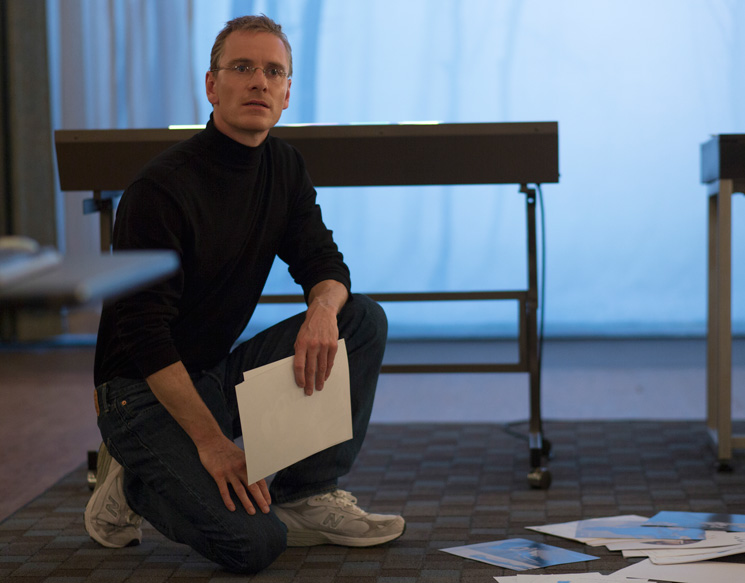
Biopics are a strange kind of beast: if they're too in-depth, they end up alienating and boring. Too short and it may have the opposite effect, making moviegoers question why certain parts were omitted, or wonder what else belongs in the story.
Screenwriter Aaron Sorkin, quite skilfully, manages to get the best of both worlds in Steve Jobs, a film that skips the nitty gritty details about the Apple co-founder's early life in favour of short snapshots that somehow bring the subjects found in Walter Isaacson's 650-plus page book even more to life.
Fans of director Danny Boyle's manic camerawork may find the film — which is broken up into three distinct 40-minute chunks, set moments before a monumental product launch — a bit dull, but he makes up for it by employing three different formats (16mm, 35mm, and digital) and an all-star cast (including Golden Globe-winner Kate Winslet alongside Michael Fassbender and Jeff Daniels) to make Jobs' life seem as electrifying and vivid as the products he helped create. (Universal)
Matthew Ritchie
6. Room
(Directed by Lenny Abrahamson)
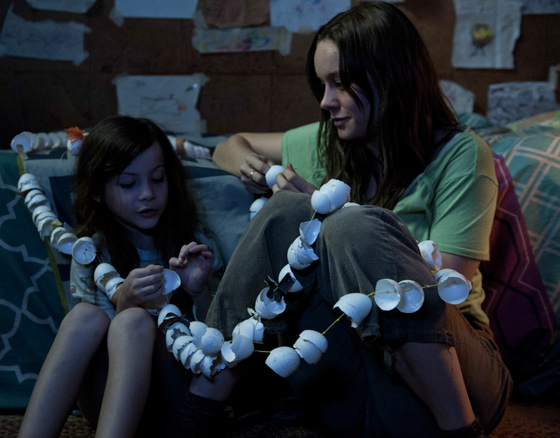
Brie Larson's performance in Room has been widely praised, and rightly so. As a young mother raising a child under strange and tragic circumstances, Larson manages to imbue her character with courage, frustration, anger, exhaustion, and the appropriate amount of immaturity for someone whose life was effectively halted at seventeen after being kidnapped and held in a shed for nine years. Her young son Jack, sheltered from a universe most kids take for granted, applies a nearly limitless imagination to life that gives everything, even "room," hope. When he and his mother finally escape and return to "the world," they find it changed in ways that even the room hasn't prepared them for, and watching them attempt to learn (and in Larson's case, re-learn) normalcy is heartbreaking and moving. Room is a deeply emotional film without ever pandering to melodrama or titillation, and an effectively infuriating scene expertly skewers the salacious way society treats "missing white women" cases. There's none of that in Room, only an honest portrayal of survival and love. (Elevation Pictures)
Laura Di Girolamo
5. Anomalisa
(Directed by Duke Johnson and Charlie Kaufman)

In order to achieve his most naturally human film yet, Charlie Kaufman resorted to the use of stop-motion animation. Co-directed by Duke Johnson, Anomalisa boasts some truly singular animation along with solid voice work from its tiny three-person cast (David Thewlis and Jennifer Jason Leigh star, while Tom Noonan is credited as "everyone else").
While the film's animation and life-affirming trailer suggests it could be overbearingly twee, there's also a bitterness beneath the animation that shows the complex range of emotions that come with an extramarital affair. Anomalisa is, in fact, rather bleak, though it's presented with a stunning realism that makes it all the more beautiful. An anomaly, to be sure. (Paramount Pictures)
Josiah Hughes
4. Kurt Cobain: Montage of Heck
(Directed by Brett Morgen)

In 2015, dyed-in-the-wool Nirvana fans got a gift they never quite saw coming: a groundbreakingly personal and poignant documentary tribute to the man who paved the way for a global alt-grunge revolution. Sidestepping the salacious biographies, the outlandish murder conspiracy theories, and all attempts to rehash Nirvana's already well-documented songwriting process, Montage of Heck instead focuses on the man himself. Beyond the flannel shirts, the cardigans and the tabloid reports of heroin addiction, Kurt was a hypersensitive, ultra-talented kid from Aberdeen, Washington whose parents' divorce and domineering dad shaped him into an outsider punk-rock icon, outspoken feminist and advocate for LGBT and minority rights.
Having been granted unprecedented access to a vault full of notebook scrawlings, home movies, cassette tape diaries (over 100 of them!) and drawings from Kurt's harrowing teendom, director Brett Morgen (Chicago 10) meticulously worked his way through the archives over an eight-year period, weaving together a wildly inventive lyrical narrative that feels as though Kurt were speaking to us directly. This part-animated, part-first-person collage also gives a voice to mother Wendy, first girlfriend Tracy, sister Kim, widow Courtney and best friend/Nirvana bassist Krist.
Relying first and foremost on Kurt's diaristic documents, the kaleidoscopic Montage takes us through his bullied adolescence, his authentic creative ways, his yearning to connect with kindred spirits and his ever-delicate balancing act to be happy, often teetering on the brink of self-destruction (not to mention chronic intestinal spasms). Beyond the rapturous response of admirers, Morgen delivers a film that answers daughter Frances's (who executive produced the film) foremost request: to shed light as to who her father was. Beyond the mythologizing. Beyond the romanticizing. Just Kurt, as charming, clever and heartsick as can be. (HBO Documentary Films)
Michael-Oliver Harding
3. Mistress America
(Directed by Noah Baumbach)
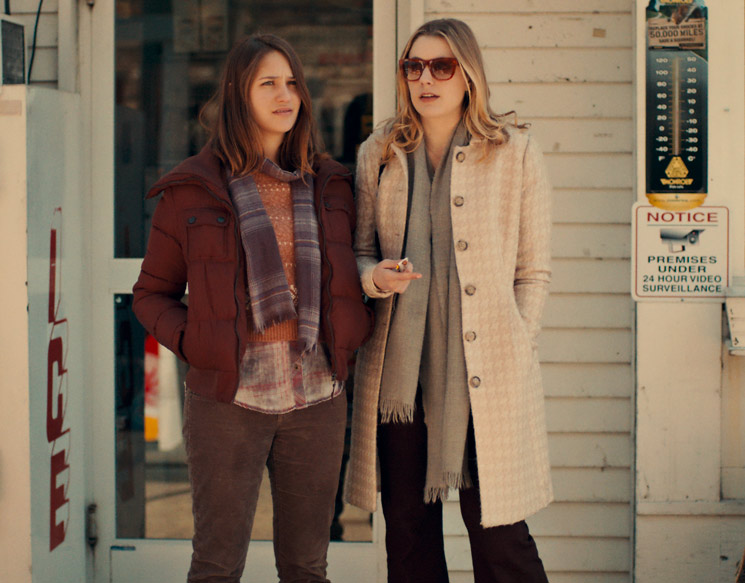
Woody Allen's Deconstructing Harry succinctly explored certain writers' tendencies to milk loved ones for 'fictional' material. Similarly, Noah Baumbach's Mistress America is interested in the act of fictionalizing friends who are already characters, but it also delights in the film's charismatically ambitious protagonist, Brooke. Greta Gerwig as Brooke is indeed a character, but that doesn't exactly give her wide-eyed little stepsister, Tracy, the right to make literary character judgments, even if they come from a place of admiration. Tracy's observations, initially a result of her own ambitions, drive the film's narrative with a profound clarity that may not be morally sound, but does offer a sad poignancy to Brooke's colourful struggle. It's a film Baumbach and Gerwig could never have made without each other, and the collaboration makes for a joyously synergetic treat. Throw in a score and hysterical performance by Galaxie 500 and Luna member Dean Wareham, and you have one of 2015's finest treasures. (Fox Searchlight)
Zach Gayne
2. Inside Out
(Directed by Pete Docter and Ronnie Del Carmen)
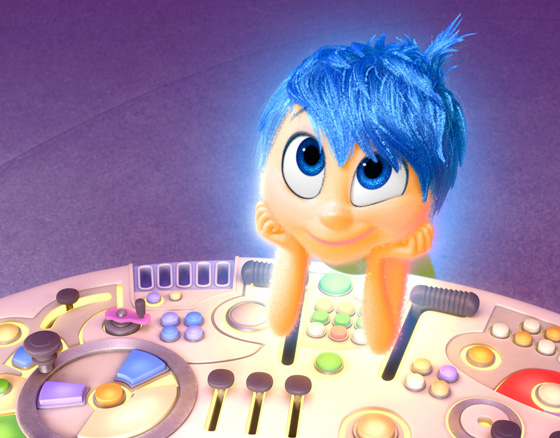
Inside Out is one of Pixar's greatest accomplishments, exploring the mind and emotions of a young girl as she deals with a changing world. The film examines our private lives and how hard it can be to understand our true feelings, and it manages to articulate those complex ideas in a visual medium that anyone can understand. Amy Poehler's Joy is one of this year's best performances and she brings a true sense of warmth to her character, but the heart of the film belongs to Phyllis Smith's Sadness. Smith's performance, along with a smart and mature screenplay by Pete Docter and Ronnie Del Carmen, allows audiences to connect with an idea most films are afraid to touch: that sadness is a valuable and necessary emotion to experience, and that many of our emotions are deeply complicated. This is as open and honest a call for empathy as any film I've ever seen, and it's astonishing to see an American studio film be this direct in its message. Special mention goes to Michael Giacchino for the year's best score, one that I keep returning to months after the film's release. After a shaky few years from Pixar, Inside Out is a remarkable return to form. (Disney)
Ben Harrison
1. Mad Max: Fury Road
(Directed by George Miller)
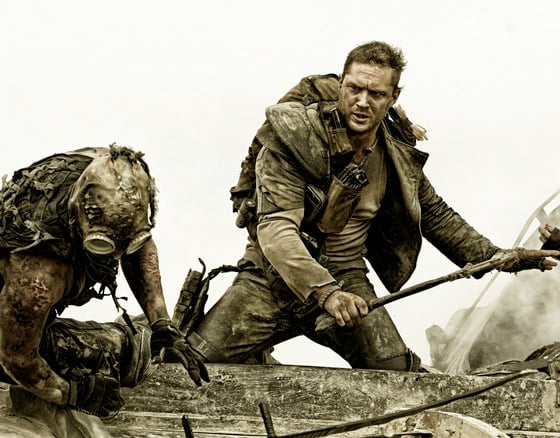
For the most part, Hollywood hasn't had a decent original idea in a long ass time, and the world of sequels, remakes and reboots is starting to feel exhausting. With Mad Max: Fury Road, however, George Miller somehow managed to reinvigorate his timeless Mad Max trilogy while also bringing a number of fresh ideas to the table.
The film is a gritty, relentless action movie with plenty of art house tendencies, and while Tom Hardy's stoic tough guy is a perfect Max, the movie isn't even really about him. Instead, Charlize Theron's Furiosa is the real protagonist. A female-led action movie might've pissed off some message board dweebs, but it was a perfect choice to add some depth to the film. All in all, Mad Max: Fury Road was the best movie-going experience of 2015 — a year that also saw the release of an excellent new Star Wars movie. (Warner Bros.)
Josiah Hughes
10. Creed
(Directed by Ryan Coogler)

When a spin-off of the Rocky franchise focusing on the son of Apollo Creed was initially announced, the decision elicited far more eye rolls than cheers. After all, it had been nearly 40 years since Sylvester Stallone first introduced his underdog boxer to moviegoers and, after five sequels, nearly everyone believed both Rocky and the series were ready to be finally put out to pasture. Yet another return to the ring after what certainly seemed like his final swan song in 2006 with Rocky Balboa would only be viewed as a desperate cash grab that risked further tarnishing the legacy of an iconic character.
That's probably the biggest reason Ryan Coogler's Creed ultimately emerged as such an unlikely revelation, seamlessly passing the baton from one generation's fighter to another in a way that felt both familiar and fresh. From Michael B. Jordan filling out the title role with raw charisma, Stallone delivering his best performance in easily a decade or two and Tessa Thompson capably stepping in as the new Adrian for the younger Creed, Coogler succeeded by returning the franchise back to its gritty roots in the streets of Philadelphia and offering exhilarating fight sequences alongside genuine emotion. (Warner Bros.)
Kevin Scott
9. Spotlight
(Directed by Thomas McCarthy)

Just as the investigative reporters at the Boston Globe used their different sets of skills to bring to light a large group of priests engaged in pedophilia inside the Catholic Church, the brilliant ensemble cast in Tom McCarthy's Spotlight employs their individual talents to bring the story to life.
Mark Ruffalo gets most of the showier moments as the tireless Mike Rezendes, who learns just how difficult it can be to cut through all the red tape surrounding the case. But Michael Keaton's Robby Robinson gives the actor plenty of personal reservations to play, Rachel McAdams' plucky Sacha Pfeiffer struggles to reconcile the magnitude of their discovery with her regular visits to church with her grandmother and Liev Schreiber's editor Marty Baron calmly keeps the pressure on them.
It's immensely absorbing to watch the team doggedly pursue the facts while steeling themselves against the horrors they'll inevitably uncover, using every resource at their disposal to prove just how rampant the sexual abuse truly was. It's a chilling reminder that the most important stories can often leave you the most personally conflicted. (eOne)
Kevin Scott
8. Carol
(Directed by Todd Haynes)

Todd Haynes, master of stylized melodrama and exquisitely rendered melancholy (Far From Heaven, Mildred Pierce) has outdone himself with this wrenching, forbidden love story set in mid-century Manhattan. Based on Patricia Highsmith's cult-classic novel chronicling the irrepressible love affair between the titular polished suburban housewife (Cate Blanchett) and Therese (Rooney Mara), a younger, sprightlier department store clerk, Carol is an Edward Hopper painting come alive, with the scrupulously angular design of its cityscapes and all the shots of women longingly gazing out of windows.
Besides for Carter Burwell's evocative score, Ed Lachman's swoon-worthy camerawork and the spotless period production design, what sets Carol apart from other epic love stories are Blanchett and Mara's carefully calibrated restraint in conveying a full-blown fire raging inside. A hand resting on a shoulder a few beats longer than it should, a feral gaze sustained from across a crowded room, a subtle vocal inflection that suggests a titanic thirst for passion…
Carol is of course eye-opening for its deftly handed exploration of the era's sexism and homophobia – Blanchett's miserable New Jersey mother risks losing custody of her 4-year-old if her soon-to-be-ex-husband (Kyle Chandler) lays down the 'lesbian' charge. But beyond harkening back to America's disapproving mores, which wouldn't unshackle women like Carol and Therese from their gendered obligations, Haynes also captures key moments of intimacy between the discreet lovers. Moments that are not merely overlooked, but also downright jeopardized or tragically interrupted by a slew of heedless intruders. If anything, these instances only fuel the two women's virtuosic desire to run off together, far from the oblivious masses, and live out their outsider fairytale. You'll soon be wishing them the same. (eOne)
Michael-Oliver Harding
7. Steve Jobs
(Directed by Danny Boyle)

Biopics are a strange kind of beast: if they're too in-depth, they end up alienating and boring. Too short and it may have the opposite effect, making moviegoers question why certain parts were omitted, or wonder what else belongs in the story.
Screenwriter Aaron Sorkin, quite skilfully, manages to get the best of both worlds in Steve Jobs, a film that skips the nitty gritty details about the Apple co-founder's early life in favour of short snapshots that somehow bring the subjects found in Walter Isaacson's 650-plus page book even more to life.
Fans of director Danny Boyle's manic camerawork may find the film — which is broken up into three distinct 40-minute chunks, set moments before a monumental product launch — a bit dull, but he makes up for it by employing three different formats (16mm, 35mm, and digital) and an all-star cast (including Golden Globe-winner Kate Winslet alongside Michael Fassbender and Jeff Daniels) to make Jobs' life seem as electrifying and vivid as the products he helped create. (Universal)
Matthew Ritchie
6. Room
(Directed by Lenny Abrahamson)

Brie Larson's performance in Room has been widely praised, and rightly so. As a young mother raising a child under strange and tragic circumstances, Larson manages to imbue her character with courage, frustration, anger, exhaustion, and the appropriate amount of immaturity for someone whose life was effectively halted at seventeen after being kidnapped and held in a shed for nine years. Her young son Jack, sheltered from a universe most kids take for granted, applies a nearly limitless imagination to life that gives everything, even "room," hope. When he and his mother finally escape and return to "the world," they find it changed in ways that even the room hasn't prepared them for, and watching them attempt to learn (and in Larson's case, re-learn) normalcy is heartbreaking and moving. Room is a deeply emotional film without ever pandering to melodrama or titillation, and an effectively infuriating scene expertly skewers the salacious way society treats "missing white women" cases. There's none of that in Room, only an honest portrayal of survival and love. (Elevation Pictures)
Laura Di Girolamo
5. Anomalisa
(Directed by Duke Johnson and Charlie Kaufman)

In order to achieve his most naturally human film yet, Charlie Kaufman resorted to the use of stop-motion animation. Co-directed by Duke Johnson, Anomalisa boasts some truly singular animation along with solid voice work from its tiny three-person cast (David Thewlis and Jennifer Jason Leigh star, while Tom Noonan is credited as "everyone else").
While the film's animation and life-affirming trailer suggests it could be overbearingly twee, there's also a bitterness beneath the animation that shows the complex range of emotions that come with an extramarital affair. Anomalisa is, in fact, rather bleak, though it's presented with a stunning realism that makes it all the more beautiful. An anomaly, to be sure. (Paramount Pictures)
Josiah Hughes
4. Kurt Cobain: Montage of Heck
(Directed by Brett Morgen)

In 2015, dyed-in-the-wool Nirvana fans got a gift they never quite saw coming: a groundbreakingly personal and poignant documentary tribute to the man who paved the way for a global alt-grunge revolution. Sidestepping the salacious biographies, the outlandish murder conspiracy theories, and all attempts to rehash Nirvana's already well-documented songwriting process, Montage of Heck instead focuses on the man himself. Beyond the flannel shirts, the cardigans and the tabloid reports of heroin addiction, Kurt was a hypersensitive, ultra-talented kid from Aberdeen, Washington whose parents' divorce and domineering dad shaped him into an outsider punk-rock icon, outspoken feminist and advocate for LGBT and minority rights.
Having been granted unprecedented access to a vault full of notebook scrawlings, home movies, cassette tape diaries (over 100 of them!) and drawings from Kurt's harrowing teendom, director Brett Morgen (Chicago 10) meticulously worked his way through the archives over an eight-year period, weaving together a wildly inventive lyrical narrative that feels as though Kurt were speaking to us directly. This part-animated, part-first-person collage also gives a voice to mother Wendy, first girlfriend Tracy, sister Kim, widow Courtney and best friend/Nirvana bassist Krist.
Relying first and foremost on Kurt's diaristic documents, the kaleidoscopic Montage takes us through his bullied adolescence, his authentic creative ways, his yearning to connect with kindred spirits and his ever-delicate balancing act to be happy, often teetering on the brink of self-destruction (not to mention chronic intestinal spasms). Beyond the rapturous response of admirers, Morgen delivers a film that answers daughter Frances's (who executive produced the film) foremost request: to shed light as to who her father was. Beyond the mythologizing. Beyond the romanticizing. Just Kurt, as charming, clever and heartsick as can be. (HBO Documentary Films)
Michael-Oliver Harding
3. Mistress America
(Directed by Noah Baumbach)

Woody Allen's Deconstructing Harry succinctly explored certain writers' tendencies to milk loved ones for 'fictional' material. Similarly, Noah Baumbach's Mistress America is interested in the act of fictionalizing friends who are already characters, but it also delights in the film's charismatically ambitious protagonist, Brooke. Greta Gerwig as Brooke is indeed a character, but that doesn't exactly give her wide-eyed little stepsister, Tracy, the right to make literary character judgments, even if they come from a place of admiration. Tracy's observations, initially a result of her own ambitions, drive the film's narrative with a profound clarity that may not be morally sound, but does offer a sad poignancy to Brooke's colourful struggle. It's a film Baumbach and Gerwig could never have made without each other, and the collaboration makes for a joyously synergetic treat. Throw in a score and hysterical performance by Galaxie 500 and Luna member Dean Wareham, and you have one of 2015's finest treasures. (Fox Searchlight)
Zach Gayne
2. Inside Out
(Directed by Pete Docter and Ronnie Del Carmen)

Inside Out is one of Pixar's greatest accomplishments, exploring the mind and emotions of a young girl as she deals with a changing world. The film examines our private lives and how hard it can be to understand our true feelings, and it manages to articulate those complex ideas in a visual medium that anyone can understand. Amy Poehler's Joy is one of this year's best performances and she brings a true sense of warmth to her character, but the heart of the film belongs to Phyllis Smith's Sadness. Smith's performance, along with a smart and mature screenplay by Pete Docter and Ronnie Del Carmen, allows audiences to connect with an idea most films are afraid to touch: that sadness is a valuable and necessary emotion to experience, and that many of our emotions are deeply complicated. This is as open and honest a call for empathy as any film I've ever seen, and it's astonishing to see an American studio film be this direct in its message. Special mention goes to Michael Giacchino for the year's best score, one that I keep returning to months after the film's release. After a shaky few years from Pixar, Inside Out is a remarkable return to form. (Disney)
Ben Harrison
1. Mad Max: Fury Road
(Directed by George Miller)

For the most part, Hollywood hasn't had a decent original idea in a long ass time, and the world of sequels, remakes and reboots is starting to feel exhausting. With Mad Max: Fury Road, however, George Miller somehow managed to reinvigorate his timeless Mad Max trilogy while also bringing a number of fresh ideas to the table.
The film is a gritty, relentless action movie with plenty of art house tendencies, and while Tom Hardy's stoic tough guy is a perfect Max, the movie isn't even really about him. Instead, Charlize Theron's Furiosa is the real protagonist. A female-led action movie might've pissed off some message board dweebs, but it was a perfect choice to add some depth to the film. All in all, Mad Max: Fury Road was the best movie-going experience of 2015 — a year that also saw the release of an excellent new Star Wars movie. (Warner Bros.)
Josiah Hughes
